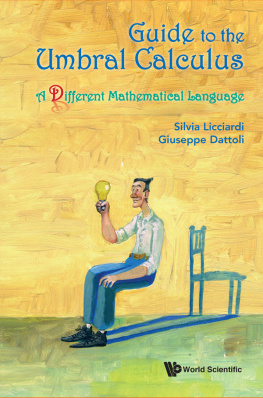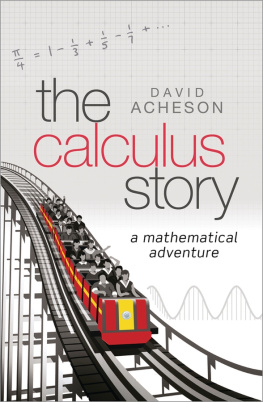Bardi Jason Socrates - The Calculus Wars
Here you can read online Bardi Jason Socrates - The Calculus Wars full text of the book (entire story) in english for free. Download pdf and epub, get meaning, cover and reviews about this ebook. City: New York, year: 2007, publisher: Basic Books;Thunders Mouth, genre: Non-fiction. Description of the work, (preface) as well as reviews are available. Best literature library LitArk.com created for fans of good reading and offers a wide selection of genres:
Romance novel
Science fiction
Adventure
Detective
Science
History
Home and family
Prose
Art
Politics
Computer
Non-fiction
Religion
Business
Children
Humor
Choose a favorite category and find really read worthwhile books. Enjoy immersion in the world of imagination, feel the emotions of the characters or learn something new for yourself, make an fascinating discovery.

- Book:The Calculus Wars
- Author:
- Publisher:Basic Books;Thunders Mouth
- Genre:
- Year:2007
- City:New York
- Rating:4 / 5
- Favourites:Add to favourites
- Your mark:
- 80
- 1
- 2
- 3
- 4
- 5
The Calculus Wars: summary, description and annotation
We offer to read an annotation, description, summary or preface (depends on what the author of the book "The Calculus Wars" wrote himself). If you haven't found the necessary information about the book — write in the comments, we will try to find it.
The Calculus Wars — read online for free the complete book (whole text) full work
Below is the text of the book, divided by pages. System saving the place of the last page read, allows you to conveniently read the book "The Calculus Wars" online for free, without having to search again every time where you left off. Put a bookmark, and you can go to the page where you finished reading at any time.
Font size:
Interval:
Bookmark:

Copyright 2006 by Jason Socrates Bardi
Published in 2010 by Basic Books,
A Member of the Perseus Books Group
Published in 2006 by Thunders Mouth Press
All rights reserved. Printed in the United States of America. No part of this book may be reproduced in any manner whatsoever without written permission except in the case of brief quotations embodied in critical articles and reviews. For information, address Basic Books, 387 Park Avenue South, New York, NY 10016-8810.
Books published by Basic Books are available at special discounts for bulk purchases in the United States by corporations, institutions, and other organizations. For more information, please contact the Special Markets Department at the Perseus Books Group, 2300 Chestnut Street, Suite 200, Philadelphia, PA 19103, or call (800) 810-4145, ext. 5000, or e-mail .
Book design by Pauline Neuwirth, Neuwirth & Associates, Inc.
A CIP catalog record for this book is available from the Library of Congress.
ISBN: 978-0-78673-364-4
9 8 7 6 5 4 3
Contents
A T THE BEGINNING of the eighteenth century, Gottfried Wilhelm Leibniz (16461716) and Sir Isaac Newton (16421727) were about to go to war.
For more than ten bitter years, these two brilliant figures in German and British mathematics would fight a brutal public battle to the ends of their lives, in which each man defended his own right to claim intellectual ownership of calculusthe branch of mathematical analysis useful for investigating everything from geometrical shapes to the orbits of planets in motion around the sun.
One of the greatest intellectual legacies of the seventeenth century, calculus was developed first by Newton in his creative years of 1665 and 1666, when he was a young Cambridge University student on retreat at his country estate. Suddenly cut off from his professors and classmates, Newton spent two years in near-absolute isolation doing experiments and thinking about the physical laws that govern the universe. What emerged from these years is perhaps the greatest single body of knowledge any scientist has ever produced in such a short period. Newton made major discoveries concerning modern optics, fluid mechanics, the physics of tides, the laws of motion, and the theory of universal gravitation, to name a few.
Most important, Newton had invented calculus, which he called his method of fluxions and fluents. But he kept this work a closely held secret for most of his life. He preferred to circulate private copies of his projects among his friends, and did not publish any of his calculus work until decades after its inception.
Leibniz came upon calculus ten years later, during the prolific time he spent in Paris around 1675. Over the next ten years, he refined his discovery and developed a completely original system of symbols and notations. Though second in time, he was first to publish his calculus, which he did in two papers that appeared in 1684 and 1686. With these two papers, Leibniz was able to claim intellectual ownership for the original invention of calculus. And calculus was such a promising invention that, by the year 1700, Leibniz would be regarded by many in Europe as one of the greatest mathematicians alive.
Leibniz and Newton both had a claim of ownership on calculus, and today they are generally regarded as twin independent inventors, both credited with giving mathematics its greatest push forward since the time of the Greeks.
While the glory of the invention may be great enough for todays scholars to share, it was not enough for Leibniz and Newton, and by the end of the seventeenth century accusations of impropriety were being raised by the backers of both men. The first two decades of the eighteenth century would see the eruption of the calculus wars.
Leibniz had seen some of Newtons early private work, and this was enough to suggest to Newton that Leibniz was a thief. Once he became convinced of this, Newton was largely on the offensive, and he would wield his reputation to great effect. Newton knew that he had invented calculus first, and he could prove it. Still rolling in the glory of his past exploits, he was able to employ henchmen to write attacks against Leibniz, suggesting he stole Newtons ideas, and defending himself against any criticisms that arose. Newton acted not out of empty malice or jealousy but with the firm conviction that Leibniz was a thief. He saw the calculus wars as his opportunity for redemption and a chance for him to reclaim one of the greatest parts of his lifes work.
There was no backing down for Leibniz, either. Not one to take such a threat lightly, he fought back, with the aid of followers claiming it was Newton who borrowed Leibnizs ideas. Further, Leibniz worked the community of intellectuals in Europe, by writing letter after letter in support of his own cause. He wrote numerous articles defending himself and multiple anonymous attacks of Newton, and brought the dispute to the highest levels of government, even to the king of England.
At the height of the calculus wars, Newton and Leibniz were attacking each other both openly and in secret, through anonymously written papers and ghost-authored publications. They were both recognized as among Europes greatest intellects, and both wielded their reputations to maximum effect. Both enlisted trusted colleagues to their cause, and split many of their contemporaries into two camps, championing one or the other. They collected tomes of evidence, wrote volumes of arguments, and were enraged each time they read the accusations of the other. Had Leibniz not died in 1716, the dispute no doubt would have continued even longer, and in a sense the calculus wars did not even stop then, since Newton continued to publish defenses of himself even after Leibnizs death.
Who was right? Newton had a good point in asserting his priority in the invention, and he certainly successfully asserted it. By the time he died, he was recognized not just in England but throughout Europe for having discovered calculus prior to Leibniz.
In England, there still hangs a famous 1702 painting of Newton by Sir Godfrey Kneller in the National Portrait Gallery in London. It shows a middle-aged man in a flowing academic-type brown robe with a slight collar in a brilliant indigo. Newton has large round eyes with slight bags underneath, and the artist brushes pink on his cheeks, nose, and forehead, while blending blue with the flesh tones on Newtons face. The effect is to make him look less ominous than his expression would suggest, though it still seems hard to imagine any humor cracking his serious look.
What could be more truthfulNewton did discover calculus first, ten years before Leibniz did anything. But then again, so what? Leibniz had every right to claim his priority for inventing calculus. He invented calculus independently, and more important, he was the first to publish his ideas, developed calculus more than Newton, had far superior notation (one still used to this day), and worked for years to move calculus forward into a mathematical framework that others could use as well. One could argue as easily that Leibnizs methodology made a greater contribution to the history of mathematics.
Perhaps if Leibniz and Newton had been acquainted under other circumstances, they might have been friends, as they read the same books and both studied the major mathematical and philosophical problems of their day. Leibniz certainly would have loved adding Newton to his vast list of European intellectuals with whom he corresponded regularly over his lifetime. But they never met, and their closest interactions were a brief exchange of letters when they were young men, one letter each during middle age, and another brief exchange when they were old men. Decades passed between their correspondences.
Next pageFont size:
Interval:
Bookmark:
Similar books «The Calculus Wars»
Look at similar books to The Calculus Wars. We have selected literature similar in name and meaning in the hope of providing readers with more options to find new, interesting, not yet read works.
Discussion, reviews of the book The Calculus Wars and just readers' own opinions. Leave your comments, write what you think about the work, its meaning or the main characters. Specify what exactly you liked and what you didn't like, and why you think so.








